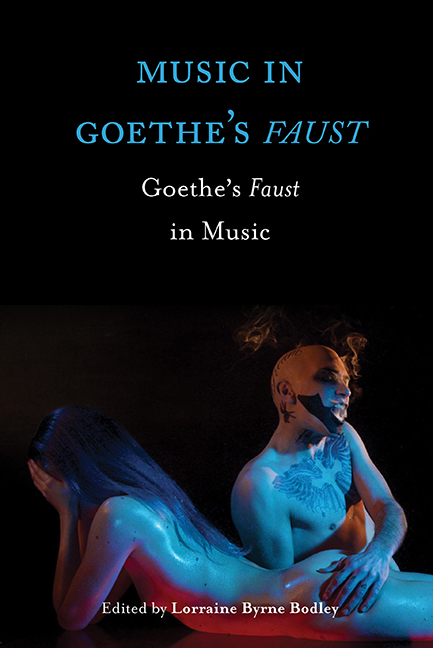Book contents
- Frontmatter
- Dedication
- Contents
- List of Illustrations
- Contributors
- Acknowledgements
- Abbreviations Used in the Notes
- Introduction. Rhapsody and Rebuke: Goethe's Faust in Music
- Part I Goethe's Faust: Content and Context
- Part II Legacies: Goethe's Faust in the Nineteenth Century
- Part III Topographies: Stagings and Critical Reception
- 12 Operatic Translation and Adaptation: Gounod's Faust, with a Tribute to Ken Russell
- 13 ‘Adapters, Falsifiers and Profiteers’: Staging La Damnation de Faust in Monte Carlo and Paris, 1893–1903
- 14 Faust in the Trenches: Busoni's Doktor Faust
- Part IV New Directions: Recent Productions and Appropriations
- Select Bibliography
- Index
13 - ‘Adapters, Falsifiers and Profiteers’: Staging La Damnation de Faust in Monte Carlo and Paris, 1893–1903
from Part III - Topographies: Stagings and Critical Reception
Published online by Cambridge University Press: 30 August 2017
- Frontmatter
- Dedication
- Contents
- List of Illustrations
- Contributors
- Acknowledgements
- Abbreviations Used in the Notes
- Introduction. Rhapsody and Rebuke: Goethe's Faust in Music
- Part I Goethe's Faust: Content and Context
- Part II Legacies: Goethe's Faust in the Nineteenth Century
- Part III Topographies: Stagings and Critical Reception
- 12 Operatic Translation and Adaptation: Gounod's Faust, with a Tribute to Ken Russell
- 13 ‘Adapters, Falsifiers and Profiteers’: Staging La Damnation de Faust in Monte Carlo and Paris, 1893–1903
- 14 Faust in the Trenches: Busoni's Doktor Faust
- Part IV New Directions: Recent Productions and Appropriations
- Select Bibliography
- Index
Summary
As recently as May 2011 the London newspapers reminded us that Berlioz's La Damnation de Faust ‘really isn't an opera at all’, but rather an ‘unstageable’ work, ‘never intended for the opera house’. Such cautions and qualifications have followed the work since its first theatrical staging in Monte Carlo in 1893, a popular success that inspired imitations in England, Italy, Germany and the Netherlands during the next decade and which was revived in Paris during the Berlioz centenary celebrations of 1903. At various stages of its composition Berlioz called it a ‘drame de concert’, an ‘opéra de concert’ and an ‘opéralégende’, finally settling on ‘légende dramatique’, a designation that raises more questions than it answers with its contradictory evocations of the private, internal activity of reading and the public, collective activity of drama. Daniel Albright dubs it a ‘semi-opera’, reconciling the presence of some operatic features – a libretto divided into scenes, dialogue, stage directions, soloists and choruses giving voice to characters in a discernible story – with the absence of others, such as costumes, sets, stage action and dramatic continuity. One may make an analogy between this musical légende dramatique and the literary ‘closet drama’, a play to be read rather than enacted, seen and heard. Although Berlioz's légende dramatique is performed audibly rather than read silently, and although it takes place in public before a collective audience rather than being consumed privately, it similarly evokes action and character in the imagination rather than through picture and gesture. As an unstaged drama for the ‘mental theatre’, it claims unique capacities to transcend physical and material limits.
The first Paris staging of La Damnation de Faust in 1903, a revival of the production originally created ten years earlier in Monte Carlo by impresario Raoul Gunsbourg, thus raises aesthetic questions about the relationships between music, staging, materiality and embodiment, and also historical questions about the French musical canon and musical identity and Berlioz's place in those systems. But where does the story of Gunsbourg's production and its Paris reception truly begin? In the spirit of Goethe's Faust, I will begin with three brief Prologues to the main action.
- Type
- Chapter
- Information
- Music in Goethe's FaustGoethe's Faust in Music, pp. 214 - 229Publisher: Boydell & BrewerPrint publication year: 2017



